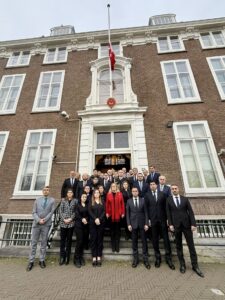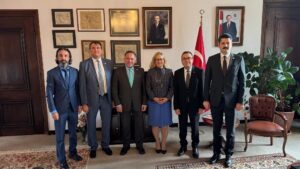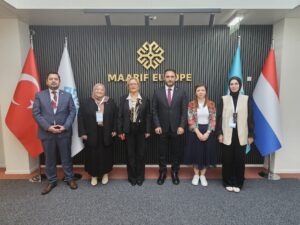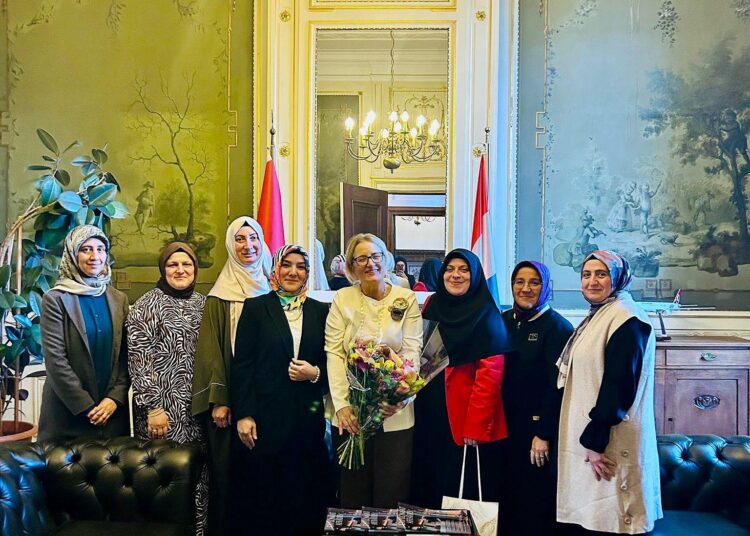Abdullah Bozkurt / Stockholm
The Turkish government has established and operated a clandestine intelligence cell inside its embassy in The Hague to gather information on journalists, dissidents and critics of Turkish President Recep Tayyip Erdogan throughout Europe, according to a trove of secret documents obtained by Nordic Monitor.
The revelation exposes yet another layer of Ankara’s increasingly aggressive campaign of transnational repression, one that stretches across borders, abuses diplomatic immunity and weaponizes state institutions to silence opponents abroad.
The original classified document, stamped Gizli (Secret), was first transmitted to the interior ministry’s foreign relations department (İçişleri Bakanlığı Dış İlişkiler Dairesi) on October 21, 2025. One week later, on October 28, deputy department head Turgay Olgun forwarded it, together with a cover letter also marked secret, to the Gendarmerie General Command (Jandarma) and the Security Directorate General (Emniyet) for immediate action.
The chain of transmissions underscores how seriously Ankara treats intelligence gathered outside Turkish territory and the expectation that domestic law enforcement responds to foreign-sourced data as if it were collected at home.
The documents reveal that the Turkish Embassy in The Hague has recently began hosting a secret intelligence unit. This cell was not tasked with diplomatic outreach or consular affairs but with the systematic surveillance and profiling of political exiles, journalists and perceived opponents in diaspora communities across Europe.
Nordic Monitor has documented similar operations at other Turkish embassies, including those in Berlin, Vienna, Brussels, Ottawa and Washington, reflecting a wider global pattern of diplomatic missions being used as operational bases for intelligence work.
The intelligence note collected by the secretive unit inside the Turkish Embassy compound in The Hague was stamped *Secret”; identifying information was removed by Nordic Monitor for privacy and safety reasons:
The operation in The Hague is run by Col. Ahmet Murat Karaçam, who arrived on October 4, 2024, under the diplomatic cover of “counsellor.” He was aided by police chief Tuncay Kızıltuğ, dispatched by Turkey on September 30, 2024 under the same title. Both men are believed to have strong links to Turkish intelligence structures and were embedded in the embassy specifically to conduct and coordinate intelligence activities rather than engage in genuine diplomatic work.
The covert operations intensified after the appointment of Ambassador Fatma Ceren Yazgan, an intelligence operative with a long career at the National Intelligence Organization (MIT) and later within the intelligence arm of the foreign ministry. Yazgan previously headed the Security and Research Directorate (Araştırma ve Güvenlik İşleri Genel Müdürlüğü), which was widely known to function as the foreign ministry’s covert intelligence service. After Hakan Fidan, the former intelligence chief, became foreign minister in the summer of 2023, the directorate was renamed the Intelligence and Research Directorate, reflecting an even more open fusion of foreign policy and intelligence operations.

Her posting to the Netherlands, a NATO member, an EU state and home to one of the most politically active Turkish diasporas, was seen by multiple analysts as strategic. Yazgan’s arrival created an environment in which intelligence work was not only tolerated inside the embassy but actively cultivated. Her presence aligned diplomatic and security objectives in a manner that blurred the separation between diplomacy and covert operations, a hallmark of Turkey’s foreign policy in recent years.
The documents list four Turkish nationals — whose identities Nordic Monitor withheld for privacy and safety reasons — who were targeted by the Hague-based intelligence cell. Their inclusion illustrates both the scope of the unit’s operations and the degree of detail with which the embassy collected, processed and transmitted information about residents in diaspora communities back to Turkey. This form of targeted surveillance reflects a broader pattern in which Ankara profiles critics of President Erdogan, seeks their extradition through the abuse of legal mechanisms, pressures host governments and intimidates or harasses their relatives in Turkey.
The intelligence gathered in The Hague did not end in diplomatic files. A second classified document, prepared as an official communiqué and dated September 30, 2025, shows that information collected by the embassy cell was directly integrated into Turkey’s domestic security apparatus. In this communiqué, Barış Özdemir, deputy head of the Security Directorate General’s counterterrorism department, ordered provincial police units across Turkey to evaluate and act on the intelligence provided by the embassy.
Classified letter issued by the Security Directorate General references the intelligence received from the Turkish Embassy in The Hague and instructs provincial police departments to assess the information in coordination with local intelligence units:
Özdemir stressed the sensitivity of the operation, warning that the original cover letter and annexes “must absolutely not be shared.” He instructed police to conduct research, assessments and evaluations only in coordination with domestic intelligence units and to focus solely on individuals whose birth registration records were tied to their respective provinces. This method of compartmentalization ensured that individual police departments were only aware of the portion of the wider operation that related to their jurisdiction, reducing the chances of exposure.
The carefully coded language of the directive suggests that Turkish authorities understood the diplomatic risks should their clandestine operations in the Netherlands become public. Intelligence-gathering targeting political exiles and foreign nationals on European soil violates both Dutch law and the Vienna Convention on Diplomatic Relations, which strictly prohibits espionage under diplomatic cover.
The covert unit in The Hague is not an isolated operation but part of a larger architecture of global intelligence network that Ankara has developed and refined over the past decade. Since an intelligence-orchestrated false flag coup attempt in 2016, a turning point that enabled the consolidation of Erdogan’s rule, Turkish intelligence, police, the foreign ministry and even religious institutions have been tasked with intelligence gathering activities with an operational aspect, not only pursuing critics abroad but also influencing the policies of foreign governments, destabilizing social cohesion and undermining host governments’ policies.

During this period, Turkey has forcibly repatriated more than a hundred dissidents from countries with weak rule of law and fragile democratic institutions while repeatedly abusing INTERPOL mechanisms in attempts to issue politically motivated Red Notices and diffusion notices. Ankara has also pressured foreign governments, often through bribes, trade incentives and arms deals, to shut down institutions linked to the Gülen movement, a group critical of the Erdogan government’s radical policies. At the same time, Turkish diplomatic missions have been repurposed into forward operating bases for aggressive surveillance and intelligence-gathering activities targeting critics abroad.
Those targeted in Europe and North America include volunteers associated with the Gülen movement, Kurdish dissidents, left-wing activists, critical academics, journalists in exile and even non-Turkish Muslim community leaders who resisted Ankara’s influence. Turkish authorities have systematically attempted to infiltrate diaspora organizations and mobilize them in line with Ankara’s political objectives.
Beyond traditional intelligence collection, the Erdogan government has sought to expand its influence by cultivating extensive networks of proxy organizations. These networks encompass Turkish community associations, religious institutions operating under the Religious Affairs Directorate (Diyanet) and a range of non-Turkish Muslim groups including Muslim Brotherhood affiliates and segments of Syrian refugee communities as well as Palestinian and Rohingya organizations that Ankara aims to influence, co-opt or strategically mobilize in support of its foreign policy and ideological objectives.
Another classified letter issued by the Security Directorate General reveals that the original intelligence was received from the Turkish Embassy in The Hague on October 21, 2025:
In the Netherlands, Germany, Austria, Belgium and France, multiple intelligence agencies have documented how Turkish operatives and affiliated organizations mobilize diaspora communities to advance Ankara’s political interests. These activities include attempts to silence dissent within migrant communities, influence local and national elections, shape public debate and pressure European governments on sensitive policy issues.
The revelation of the Hague-based intelligence cell illustrates a critical shift in Ankara’s foreign policy. Traditionally, Turkish diplomacy has emphasized soft power, regional engagement and multilateral cooperation. Under Erdogan Turkey’s diplomatic missions have increasingly been retooled to function as arms of the security state where the rule of law and fundamental rights and freedoms were totally ignored.
Today, a broad array of Turkish state institutions — including the interior ministry, MIT, the foreign ministry’s intelligence arm, the national police, the gendarmerie, the Diyanet and government-aligned diaspora organizations — operate in a coordinated, multilayered system whose core aims are control, deterrence and intimidation. This architecture is designed not only to project Turkey’s domestic repression far beyond its borders and into European capitals but also to shape and influence the policies of host governments on a wide range of issues that often extend well beyond diaspora affairs.

The classified documents obtained by Nordic Monitor provide rare insight into the operational details of Turkey’s transnational repression network. The establishment of a covert intelligence cell inside a NATO ally’s embassy — and the transmission of its intelligence to local police units for implementation — marks a significant escalation in Ankara’s covert activities abroad.
The existence of such a unit raises urgent questions for Dutch authorities and other European governments about the extent of Turkey’s intelligence activities on their soil, the safety of dissidents living in Europe and the broader implications for diplomatic integrity and the rule of law.
As Ankara deepens its practice of using diplomatic missions as extensions of its security and intelligence apparatus, European states may find themselves forced to respond more decisively through expulsions, sanctions or legal action to safeguard their sovereignty and protect the exiles who sought refuge within their borders.













